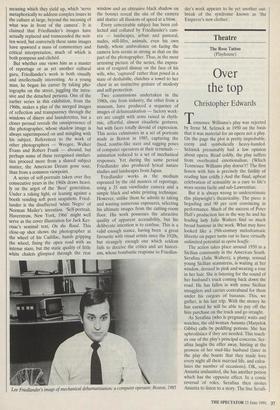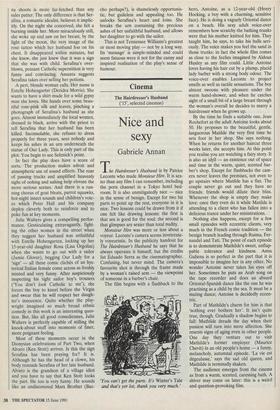Theatre
The Rose Tattoo (Playhouse)
Over the top
Christopher Edwards
Tennessee Williams's play was rejected by Irene M. Selznick in 1950 on the basis that it was material for an opera not a play. On the page the plot is pretty improbable, corny and symbolically heavy-handed. Selznick presumably had a low opinion about opera. Read coldly, the play suffers from overheated emotionalism. (Which Tennessee Williams play doesn't? The first lesson with him is precisely the futility of reading him coldly.) And the final, upbeat celebration of sensuality as a cure to life's woes seems facile and sub-Lawrentian.
But it is always wrong to underestimate this playwright's theatricality. The piece is beguiling and 90 per cent convincing in performance. Much of the success of Peter Hall's production lies in the way he and his leading lady Julie Walters find so much broad humour in the work. What may have looked like a 19th-century melodramatic libretto on paper turns out to have virtually unlimited potential as opera bouffe.
The action takes place around 1950 in a Sicilian community in the American South. Serafina (Julie Walters), a plump, sensual young Sicilian seamstress, is waiting at her window, dressed in pink and wearing a rose in her hair. She is listening for the sound of her husband's truck coming back down the road. He has fallen in with some Sicilian smugglers and carries contraband for them under his cargoes of bananas. This, we gather, is his last trip. With the money he has earned he will be able to pay off the hire purchase on the truck and go straight.
As Serafina (who is pregnant) waits and watches, the old woman Assunta (Matyelok Gibbs) calls by peddling potions. She has aphrodisiacs if they are needed. This touch- es one of the play's principal concerns. Ser- afina laughs the offer away, hinting at the prowess of her stud-like husband (later in the play she boasts that they made love every night all their married life, and calcu- lates the number of occasions). OK, says Assunta undaunted, she has another potion which has the opposite effect. In a comic reversal of roles, Serafina then invites Assunta to listen to a story. The line Serafi- na shoots is more far-fetched than any sales patter. The only difference is that Ser- afina, a romantic idealist, believes it implic- itly. On the night she conceived, she felt a burning inside her. More miraculously still, she woke up and saw on her breast, by the light of the moon, the very image of the rose tattoo which her husband has on his chest. It disappeared within minutes, but she knew, she just knew that it was a sign that she was with child. Serafina's over- blown, peasant Catholic superstition is very funny and convincing. Assunta suggests Serafina takes over selling her potions.
A pert, blonde woman calls. Her name is Estelle Hohengarter (Deridra Morris). She wants to have a shirt made for a wild gypsy man she loves. She hands over some beau- tiful rose-pink silk and leaves, pinching a photograph of Serafina's husband as she goes. Almost immediately the local women, dressed in black, arrive with the priest to tell Serafina that her husband has been killed. Inconsolable, she refuses to dress properly for three years, sees nobody and keeps his ashes in an urn underneath the statue of Our Lady. This is only part of the plot. You begin to see Selznick's point.
In fact the play does have a score of sorts. The production makes adroit and atmospheric use of sound effects. The roar of passing trucks and amplified heavenly sighs of oohing and aahing help elevate the more serious scenes. And there is a run- ning chorus of goat bleats, parrot squawks, hot-night insect sounds and children's voic- es which Peter Hall and his company deploy cleverly both to reinforce and to poke fun at key moments.
Julie Walters gives a compelling perfor- mance. Gesticulating extravagantly, fight- ing the other women in the street when they suggest her husband was unfaithful with Estelle Hohengarten, locking up her 15-year-old daughter Rosa (Lisa Orgolini) when she wants to go out with a sailor (Jamie Glover), begging Our Lady for a 'sign' — all these comic clichés of an hys- terical Italian female come across as freshly minted and very funny. After suspiciously inspecting his tight sailor boy's trousers (`You don't look Catholic to me'), she forces the boy to kneel before the Virgin and swear that he will respect her daugh- ter's innocence. Quite whether the play- wright imagined so much broad ethnic comedy in this work is an interesting ques- tion. But, like all good comediennes, Julie Walters is perfectly capable of stilling the knock-about stuff into moments of finer, more poignant feeling.
Most of these moments occur in the Dionysian celebrations of Part Two, when Alvaro (Ken Stott) arrives. Is this the sign Serafina has been praying for? It is. Although he has the head of a clown, his body reminds Serafina of her late husband. Alvaro is the grandson of a village idiot and you have to say that Ken Stott looks the part. He too is very funny. He sounds like an undiscovered Marx Brother (Bac-
cho perhaps?), is shamelessly opportunis- tic, but guileless and appealing too. He unlocks Serafina's heart and loins. She breaks the urn containing the precious ashes of her unfaithful husband, and allows her daughter to go with the sailor.
This is not Tennessee Williams's greatest or most moving play — not by a long way. Its 'message' is simple-minded and could seem fatuous were it not for the canny and inspired realisation of the play's sense of humour.



















































 Previous page
Previous page